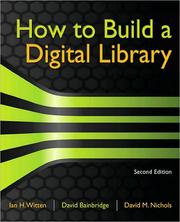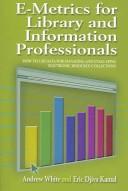| Listing 1 - 6 of 6 |
Sort by
|

ISBN: 128232909X 9786612329098 0080890393 0123748577 9780080890395 9780123748577 Year: 2009 Publisher: Burlington, MA : Morgan Kaufmann Publishers,
Abstract | Keywords | Export | Availability | Bookmark
 Loading...
Loading...Choose an application
- Reference Manager
- EndNote
- RefWorks (Direct export to RefWorks)
How to Build a Digital Library is the only book that offers all the knowledge and tools needed to construct and maintain a digital library, regardless of the size or purpose. It is the perfectly self-contained resource for individuals, agencies, and institutions wishing to put this powerful tool to work in their burgeoning information treasuries.The Second Edition of reflect new developments in the field as well as in the Greenstone Digital Library open source software. The authors have based their revisions not only on their own research but also on user feedback over the years s
Digital libraries. --- Digital libraries - Collection development - Computer programs. --- Digital libraries -- Collection development -- Computer programs. --- Digital libraries -- Collection development -- Handbooks, manuals, etc. --- Greenstone digital library software. --- Digital libraries --- Library & Information Science --- Social Sciences --- Computer programs --- Collection development --- Computer programs. --- Digital curation --- Digital media collections --- Digital media libraries --- Digital repositories --- Electronic libraries --- Electronic publication collections --- Electronic publication libraries --- Electronic text collections --- Repositories, Digital --- Virtual libraries --- Greenstone (Computer file) --- Libraries --- Information storage and retrieval systems --- Web archives --- 025:681.3 --- 681.3*H3 --- 025:681.3 Bibliotheekautomatisering --- Bibliotheekautomatisering --- Collection development&delete& --- Information storage and retrieval
Book
ISBN: 1856045552 9781856045551 Year: 2006 Publisher: London Facet
Abstract | Keywords | Export | Availability | Bookmark
 Loading...
Loading...Choose an application
- Reference Manager
- EndNote
- RefWorks (Direct export to RefWorks)
025.12 --- 025.12 Bibliotheekbeheer: statistieken, rapporten; prestatiemeting --- Bibliotheekbeheer: statistieken, rapporten; prestatiemeting --- Library research --- Library management --- Statistical science --- Computer. Automation --- Library information resources - Use studies --- Digital libraries - Collection development - Statistical methods --- Web usage mining
Book
ISBN: 9781856048378 1856048373 Year: 2012 Publisher: London Facet
Abstract | Keywords | Export | Availability | Bookmark
 Loading...
Loading...Choose an application
- Reference Manager
- EndNote
- RefWorks (Direct export to RefWorks)
Computer architecture. Operating systems --- Library management --- Digital libraries --- Collection development --- Collection development. --- Digital librariesCollection development. --- 02 --- AA / International- internationaal --- 020 --- 025.284 --- Electronic collection development (Libraries) --- Electronic library collection development --- Collection development (Libraries) --- Bibliotheekwezen --- Bibliotheekwezen: algemeenheden. --- 02 Bibliotheekwezen --- Bibliotheekwezen: algemeenheden --- Digital libraries - Collection development

ISBN: 1555705146 9781555705145 Year: 2006 Publisher: New York : Neal-Schuman Publishers,
Abstract | Keywords | Export | Availability | Bookmark
 Loading...
Loading...Choose an application
- Reference Manager
- EndNote
- RefWorks (Direct export to RefWorks)
Digital libraries --- Electronic information resources --- Web usage mining. --- Bibliothèques virtuelles --- Sources d'information électroniques --- Analyse du comportement des internautes (Informatique) --- Collection development --- Statistical methods. --- Use studies --- Développement des collections --- Méthodes statistiques --- Utilisation --- Web usage mining --- Statistical methods --- Digital libraries - Collection development - Statistical methods --- Electronic information resources - Use studies
Book
ISBN: 9781856047715 1856047717 Year: 2011 Publisher: London Facet
Abstract | Keywords | Export | Availability | Bookmark
 Loading...
Loading...Choose an application
- Reference Manager
- EndNote
- RefWorks (Direct export to RefWorks)
More and more libraries, archives, and museums are creating online collections of digitized resources. Where can those charged with organizing these new collections turn for guidance on the actual practice of metadata design and creation? "Metadata for Digital Collections: A How-to-do-it Manual" is suitable for libraries, archives, and museums. This practical, hands-on volume will make it easy for readers to acquire the knowledge and skills they need, whether they use the book on the job or in a classroom. Author Steven Miller introduces readers to fundamental concepts and practices in a style accessible to beginners and LIS students, as well as experienced practitioners with little metadata training. He also takes account of the widespread use of digital collection management systems such as CONTENTdm. Rather than surveying a large number of metadata schemes, Miller covers only three of the schemes most commonly used in general digital resource description, namely, Dublin Core, MODS, and VRA. By limiting himself, Miller is able to address the chosen schemes in greater depth. He is also able to include numerous practical examples that clarify common application issues and challenges. He provides practical guidance on applying each of the Dublin Core elements, taking special care to clarify those most commonly misunderstood. The book includes a step-by-step guide on how to design and document a metadata scheme for local institutional needs and for specific digital collection projects. The text also serves well as an introduction to broader metadata topics, including XML encoding, mapping between different schemes, metadata interoperability and record sharing, OAI harvesting, and the emerging environment of Linked Data and the Semantic Web, explaining their relevance to current practitioners and students. Each chapter offers a set of exercises, with suggestions for instructors. A companion website includes additional practical and reference resources.
Information systems --- Library automation --- Metadata --- Digital libraries --- Collection management (Libraries) --- Cataloging of electronic information resources. --- Information storage and retrieval systems. --- Digital images --- Métadonnées --- Bibliothèques virtuelles --- Gestion des collections (Bibliothèques) --- Catalogage --- Systèmes d'information --- Images numériques --- Collection development. --- Développement des collections --- Sources d'information électroniques --- Collection development --- Métadonnées --- Bibliothèques virtuelles --- Gestion des collections (Bibliothèques) --- Systèmes d'information --- Images numériques --- Développement des collections --- Sources d'information électroniques --- Digital libraries - Collection development --- Metadata - Handbooks, manuals, etc. --- Digital libraries - Handbooks, manuals, etc.
Multi
ISBN: 1856047652 1856049264 9781856049269 9781299278219 1299278213 9781856047654 Year: 2012 Publisher: London Facet
Abstract | Keywords | Export | Availability | Bookmark
 Loading...
Loading...Choose an application
- Reference Manager
- EndNote
- RefWorks (Direct export to RefWorks)
As the information environment becomes increasingly electronic, digital libraries have proliferated, but the focus has often been on innovations in technology and not the user. Although userneeds have become a popular concept, in practice the users are rarely consulted in the development of services. Research and analysis of users is essential to fine-tune the content and approach of digital libraries to the diverging requirements and expectations of incredibly varied communities and to ensure libraries are effective, accessible and sustainable in the long term. Providing a clear and coherent overview of the user studies domain and user issues in digital libraries this landmark edited text captures a truly global cross-section of leading voices.
Digital libraries -- Collection development. --- Digital libraries -- Use studies. --- Social Sciences --- Library & Information Science --- Digital libraries. --- Libraries --- Libraries and electronic publishing. --- Communication in learning and scholarship --- Special collections --- Electronic information resources. --- Technological innovations. --- Communication in scholarship --- Scholarly communication --- Electronic publishing and libraries --- Digital curation --- Digital media collections --- Digital media libraries --- Digital repositories --- Electronic libraries --- Electronic publication collections --- Electronic publication libraries --- Electronic text collections --- Repositories, Digital --- Virtual libraries --- Learning and scholarship --- Electronic publishing --- Documentation --- Public institutions --- Librarians --- Information storage and retrieval systems --- Web archives --- Electronic information resources --- Library research --- Information user --- Digital libraries --- Use studies. --- Collection development. --- Electronic collection development (Libraries) --- Electronic library collection development --- Collection development (Libraries) --- Library use studies
| Listing 1 - 6 of 6 |
Sort by
|

 Search
Search Feedback
Feedback About UniCat
About UniCat  Help
Help News
News